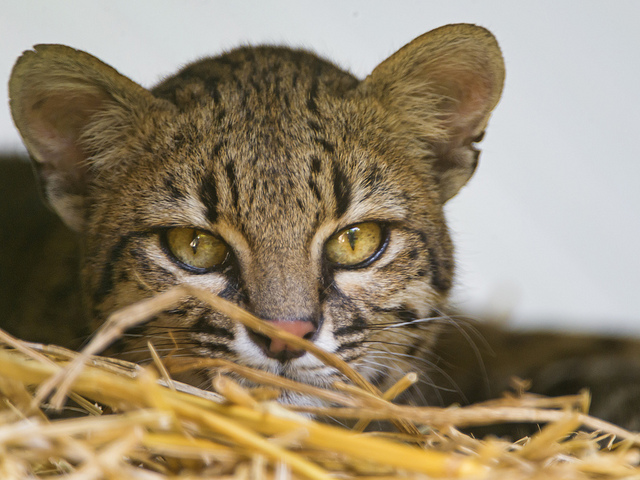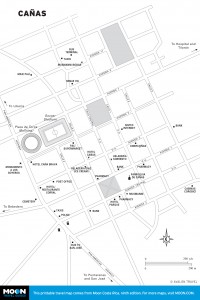
Oncilla (also known as tigrillo or tiger cats) are one of the species cared for at Centro de Rescate Las Pumas. Photo © Tambako the Jaguar, licensed Creative Commons Attribution No-Derivatives.

Cañas
Cañas is a modest-sized town and a pivotal point for exploring Parque Nacional Palo Verde (west) or Laguna de Arenal (east), and for rafting trips on the Río Corobicí. Named for the white-flowered wild cane that still grows in patches hereabouts, Cañas is indisputably a cowboy town, as the many tanned sabaneros riding horses and shaded by wide-brimmed hats attest. Note the Monumento a los Boyeros (Ave. 5 and Hwy. 1), dedicated to yesteryear’s oxcart drivers. Worth a stop is the main church—the Parroquia de Cañas (on the main plaza)—with its facade entirely inlaid with mosaic, the work of local conceptual artist Otto Apuy, who has graced the interior with psychedelic murals, including rainforest-themed stained-glass windows.A paved road runs west from Cañas 14 kilometers (9 miles) to the village of Bebedero, a gateway to Parque Nacional Palo Verde; there’s no bridge, but boats will take passengers across the wide Río Tenorio.
Seven kilometers (4.5 miles) north of Cañas and one kilometer (0.6 miles) north of the Río Corobicí, a well-paved road, Highway 6, leads northeast 58 kilometers (36 miles) to Upala in the northern lowlands via Bijagua, in the low-lying saddle of the Tenorio and Miravalles volcanoes.
Centro de Rescate Las Pumas (Las Pumas Rescue Center, tel. 506/2669-6044, 8am-4pm daily, adults $10, students and children $5), five kilometers (3 miles) north of Cañas, was founded by the late Lilly Bodmer de Hagnauer, a Swiss-born environmentalist whose passion was saving and raising big cats: ocelots, jaguars, cougars, margays, jaguarundis, and oncillas (tiger cats). All six species are housed in large chain-link cages, but beware: There are no guardrails (nor guards), and the temptation to reach out to stroke a cat through the mesh is tempting but ill-advised: These are not house cats! Most of the animals were either injured or orphaned and have been reared by Lilly or her family, who still run the zoo. Those that can be released to the wild are rehabilitated in an area closed to the public.
Other species include deer, fox, monkeys, peccaries, macaws, toucans, and dozens of parrots and other birds. It also raises rabbits for sale. By selling only nonnative species, it hopes to help change the pet-keeping habits of Ticos.
Six kilometers (4 miles) north of Cañas, the Pan-American Highway crosses the Río Corobicí. The 40-kilometer-long (25-milelong) river is fed by controlled runoff from Laguna de Arenal, providing water year-round, making it good for rafting. The trip is a relatively calm Class II run described as a “nature float.” The river is lined with a riparian forest. Motmots, herons, crested caracaras, egrets, and toucans are common, as are howler monkeys, caimans, and iguanas basking on the riverbanks.
Safaris Corobicí (tel. 506/2669-6091) has an office beside Highway 1, about 400 meters (0.25 miles) south of the river. It has guided floats on the river ($35-60), as does Ríos Tropicales, based at Restaurante Rincón Corobicí (tel. 506/2669-6262).
You can camp at Hotel Capazuri (tel. 506/2669-6280, camping $12 pp, rooms $25 pp), two kilometers (1.2 miles) north of town, on the east side of Highway 1. It has showers and toilets. The live-in owners have 19 rooms in two modern blocks. Rooms vary in size, but all are clean and meagerly furnished, with fans and private baths, all with hot water. It has a swimming pool and hosts dances on Friday and Saturday night that are popular with locals.
In town, low-end options are the Hotel y Restaurante El Corral (tel. 506/2669-0241, $20 s, $35 d), at the junction of Avenida 3 and the Pan-American Highway; Cabinas Corobicí (Ave. 2, Calle 5, tel. 506/2669-6921, $15 pp); and Hotel Cañas (Ave. 3, Calle 2, tel. 506/2669-0039, without TV $17 s, $22 d, with TV $20 s, $25, with a/c and TV $22 s, $32 d), which has a good restaurant.
Up a notch, the motel-style Hotel Caña Brava (tel. 506/2669-1294, $40 s, $50 d), one block north at the corner of Avenida 5, is the nicest place in town. Its 31 stylishly furnished rooms have Wi- Fi, and it has a swimming pool, a restaurant, and a bar.
The venerable Hacienda La Pacífica (tel. 506/2669-6050, low season $70 s, $75 d, high season $80 s, $85 d, including breakfast) is now a hotel after years as a private club. Part of a cattle and rice estate that also has an ecotourism and reforestation component, it has a delightfully rustic restaurant. The spacious rooms have high ceilings with aged wrought-iron candelabras, plus huge colonial-style oak closets, cable TV, Wi-Fi, and lovely modern baths. Alas, the mattresses and pillows are cheap and truly awful.
The nicest place to eat is the modern air-conditioned restaurant in the Hotel Cañas (Ave. 3, Calle 2, tel. 506/2669-0039, $3-10). It features cowboy paraphernalia on the walls.
The restaurant at Hacienda La Pacífica (tel. 506/2669-6050, 7am- 9pm daily, $5-15) has an eclectic menu that includes cream of tomato soup, pastas, tenderloin pepper steak, and jumbo shrimp skewer. Most dishes are served with organic rice grown on the hacienda.
Restaurante Rincón Corobicí (tel. 506/2669-6262, 8am-6pm daily), beside the Pan-American Highway, is a pleasant place to eat, with good seafood dishes and a porch over the river where you can watch rafters go by. It prepares an excellent sea bass in garlic ($10); wash it down with superb lemonade.
The Comité de Cultura (tel. 506/2669-0042), in the Edificio Palacio Municipal, on the north side of the main plaza, has visitor information. There are banks in the town center. The post office is on Avenida 3, 30 meters (100 feet) west of Calle 4. The police station (tel. 506/2669-0057) is two kilometers (1.2 miles) south of town.
Internet Ciberc@ñas (Ave. 3, Calles 1/3, tel. 506/2669-5232) is open 8:15am-9pm Monday-Saturday, 2pm-9pm Sunday. The MINAE National Park Service headquarters (tel. 506/2669-0533) is on Avenida 9, Calle Central.
Empresa La Cañera (tel. 506/2258-5792) buses depart San José (3 hours, $3) for Cañas from Calle 14, Aves. 1 and 3, at 7:30am, 9:30am, 12:45pm, 3:45pm, and 6:30pm daily. Empresa Reina del Campo (tel. 506/2663-1752) buses depart Liberia nine times daily. Buses depart Cañas for San José from Calle 1, Avenidas 9 and 11, at 5:30am, 6:30am, 8:30am, 11:50am, 12:20pm, 1:45pm, 3:30pm, and 5pm daily.
Taxis Unidos de Cañas (tel. 506/2669-0898) has taxis on call.
Excerpted from the Ninth Edition of Moon Costa Rica.